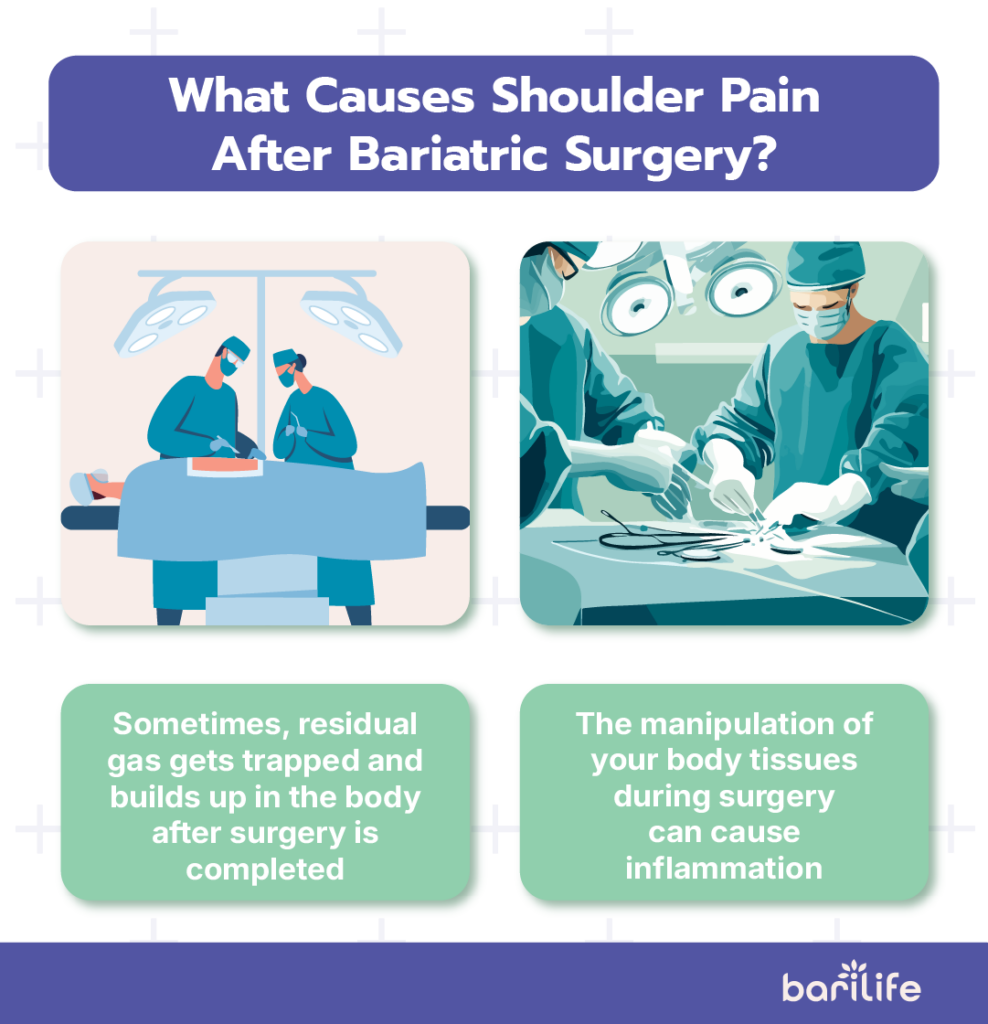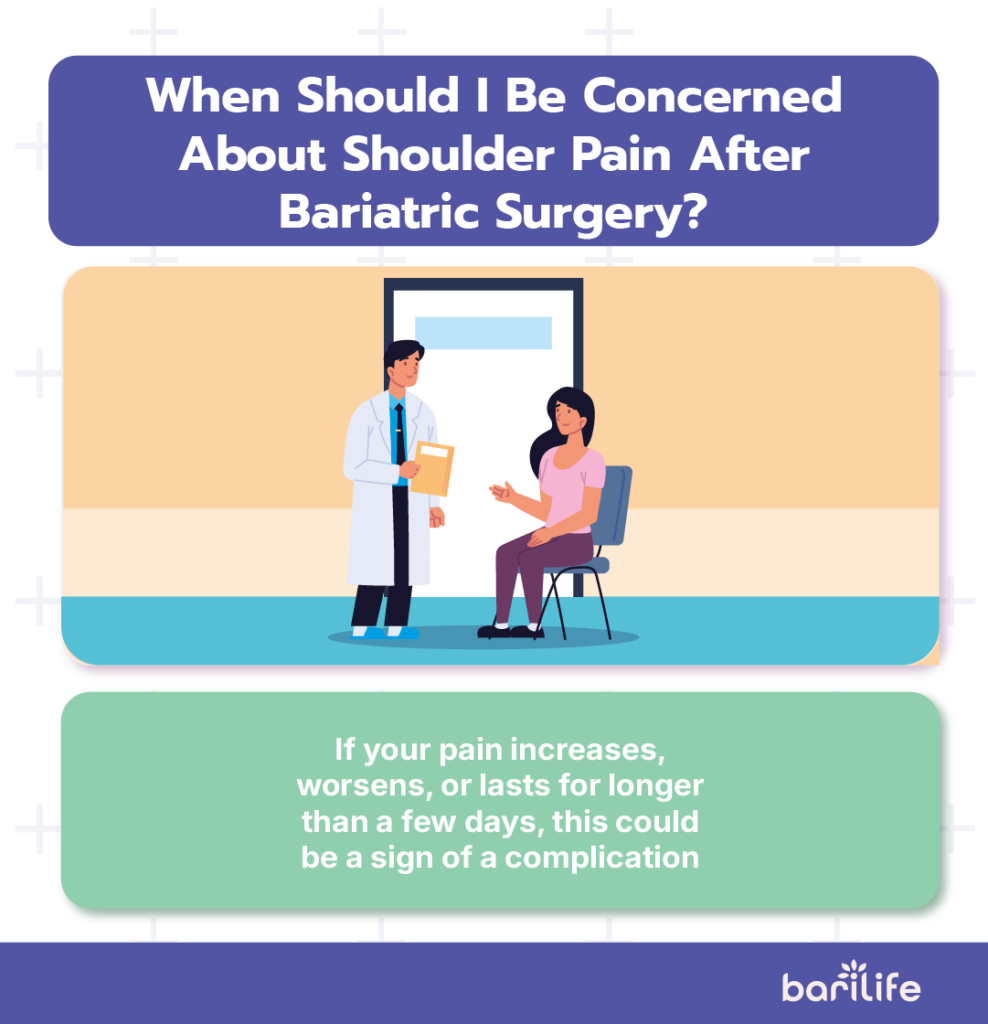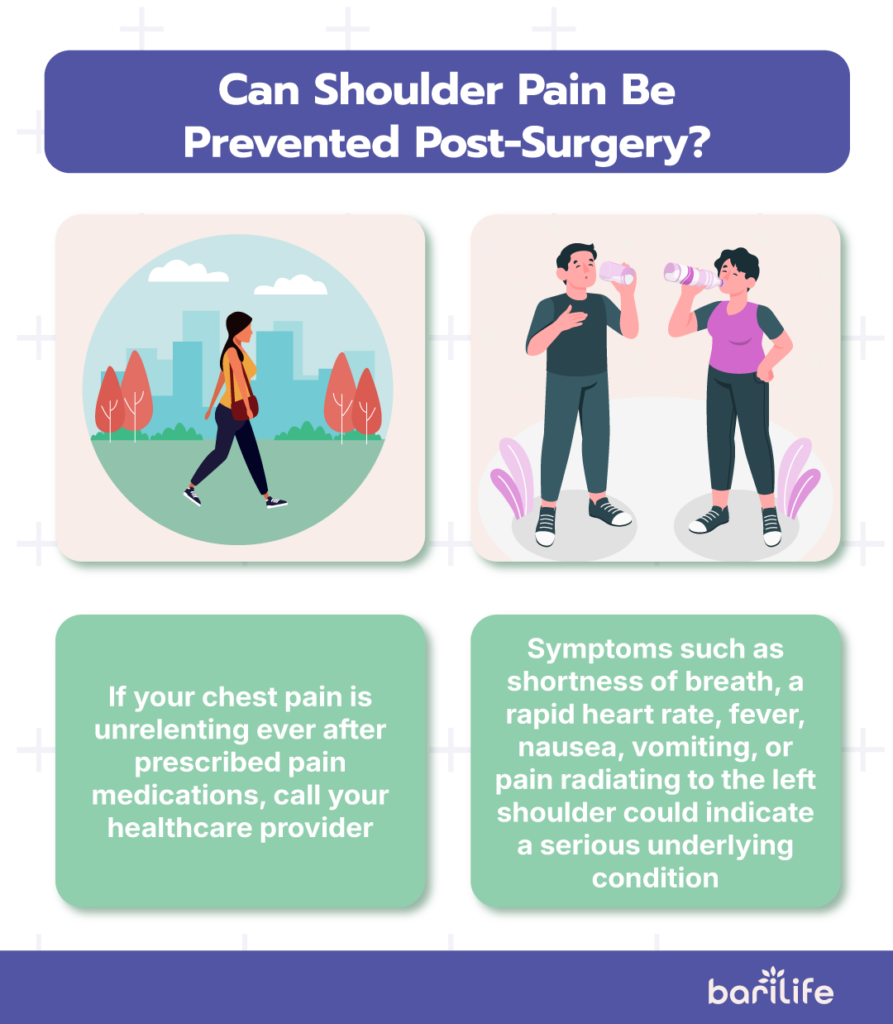Shoulder pain can be a common occurrence after bariatric surgery, but it may be surprising. While some cases are harmless, others are more severe. It’s important to be mindful of symptoms in order to seek out medical attention when it’s necessary. In this article we’ll address the causes of shoulder pain after bariatric surgery, when shoulder pain is cause for concern, review how long it typically lasts, how to relieve it, and whether or not it can be prevented after surgery.
Table of Contents
What Causes Shoulder Pain After Bariatric Surgery?

During some bariatric procedures, carbon dioxide is pumped into the abdomen in order to inflate the belly. This helps the surgeon to see and reach the surgical site more easily. Sometimes, residual gas gets trapped and builds up in the body after surgery is completed. This can lead to pain after bariatric surgery, usually occurring in the chest and shoulders.
This buildup of gas can sometimes irritate the phrenic nerve. This is the nerve that supplies both the diaphragm and the shoulder. This irritation can lead to referred pain in the shoulder.
Lastly, it’s possible that you are experiencing residual pain from surgery. The manipulation of your body tissues during surgery can cause inflammation, which could manifest as shoulder pain or even leg cramps after bariatric surgery.
To alleviate pain and aid recovery, products like bariatric vitamins and bariatric protein shakes can be valuable as they support proper healing.
Is Shoulder Pain Normal After Bariatric Surgery?
Most of the time, the shoulder pain you are experiencing after bariatric surgery is completely normal. This pain can occur due to the residual carbon dioxide gas buildup and diaphragmatic irritation, as explained above. If this is the case, your pain should only be temporary and should diminish within a few days after surgery.
However, if your pain is increasing in intensity or persists longer than a few days, it could be serious. Any pain that is worsening or long lasting should be addressed with your healthcare provider, as this could indicate something serious.
When Should I Be Concerned About Shoulder Pain After Bariatric Surgery?
Wondering when you should reach out to your doctor? The main thing to remember is that typical shoulder pain should resolve in a few days. Instead, if your pain increases, worsens, or lasts for longer than a few days, this could be a sign of a complication like an anastomotic leak.
You should also be on the lookout for other accompanying symptoms like fever, rapid heart rate, abdominal pain, or difficulty breathing. These symptoms require immediate medical attention.

Additionally, if your shoulder pain develops weeks after surgery or is associated with eating, see a doctor right away. This could indicate that you are suffering from surgical complications.
How Long Does the Shoulder Pain After Bariatric Surgery Typically Last?
Typically, shoulder pain after bariatric surgery lasts around 48 hours. This is the amount of time it usually takes your body to absorb or release the residual carbon dioxide gas. However, there are always individual variations. Some patients may experience discomfort for up to a week.
As previously discussed, if the pain persists beyond a week or worsens, you should consult your bariatric surgeon to rule out complications.
If pain persists, focusing on dietary support with bariatric protein bars and incorporating a bariatric probiotic can help reduce inflammation and support overall digestive health.
What Can I Do to Relieve the Shoulder Pain After Bariatric Surgery?
If you are struggling with shoulder pain after bariatric surgery, the following are some strategies that may help. Ambulation, or walking, soon after surgery is a great way to mobilize the built up gas in your body. This ultimately helps to reduce shoulder pain. Additionally, it may be helpful to change positions, such as lying on your side. This could alleviate some pain. If needed, it may be a good idea to use prescribed pain medication as directed by a healthcare provider to help manage this discomfort.
Can Shoulder Pain Be Prevented Post-Surgery?
By engaging in light physical activity like walking shortly after surgery, you may be able to prevent gas-related shoulder pain. This is because the gas is able to get up and out of your body quickly, before any pain begins to start. Additionally, make sure to drink enough water. Proper hydration can aid in the absorption of this residual carbon dioxide gas. Lastly, you may want to follow some deep breathing exercises. This can help to facilitate gas expulsion, which helps to reduce discomfort.
To support this activity and healing, bariatric multivitamins, bariatric snacks, and bariatric calcium chews can aid energy levels and bone health.

Conclusion
In conclusion, shoulder pain after bariatric surgery is a common but usually temporary side effect. Understanding its causes—such as residual gas buildup and nerve irritation—can help you manage and minimize discomfort. Most importantly, knowing when to seek medical attention ensures that any potential complications are addressed promptly. By staying proactive with strategies like walking, staying hydrated, and monitoring symptoms, you can support a smoother recovery and focus on the positive outcomes of your bariatric journey.




What are your tips and tricks to post-bariatric success?